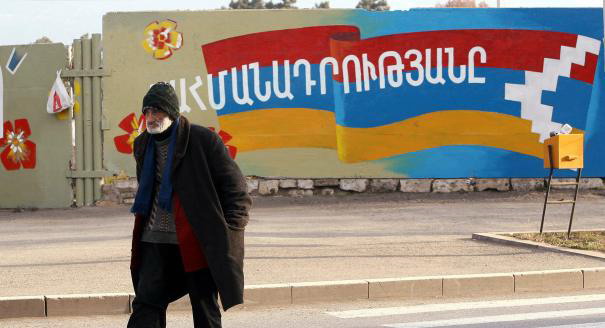The annual G8 summit has been the occasion in recent years for a statement by three presidents on the often ignored conflict over Nagorny Karabakh.
This time, the setting of Northern Ireland was a symbolic reminder that conflicts can be resolved peacefully. But the statement [Russian version] signed by presidents Francois Hollande, Barack Obama, and Vladimir Putin—representing the three countries that chair the Minsk Group negotiations, France, the United States, and Russia—will be barely noticed.
The declaration makes all the right points. It regrets that “rather than trying to find a solution based upon mutual interests, the parties have continued to seek one-sided advantage in the negotiation process.”
It rightly urges Armenians and Azerbaijanis to “refrain from any actions or rhetoric that could raise tension in the region and lead to escalation of the conflict.” This contains a message for both sides—to the Armenians who are risking danger with plans to reopen the airport in Nagorny Karabakh and resume airplane flights there, and to the Azerbaijanis who have upped their belligerent rhetoric in recent times and committed provocative acts such as the pardoning of murderer Ramil Safarov.
It ends by stating that “further delay in reaching a balanced agreement on the framework for a comprehensive peace is unacceptable.”
All laudable stuff. The only problem is that we have heard it before—including the part about how delay is unacceptable.
Two years ago in 2011 at Deauville, shortly before President Medvedev convened what was hoped to be a breakthrough meeting in Kazan, the three presidents told Armenia and Azerbaijan, “Further delay would only call into question the commitment of the sides to reach an agreement.”
Following more deadlock in Kazan, last year at the G20 summit in Mexico (Putin had skipped the G8 summit at Camp David) the three presidents stated, “The parties to the conflict should not further delay making the important decisions necessary to reach a lasting and peaceful settlement.”
The annual declaration began as a useful way of exerting influence on Armenia and Azerbaijan. This year, it looks more like a “statement for the sake of a statement” or, more crudely, an affirmation that “the Minsk Group is not dead.” But as long as Baku and Yerevan pay no price for ignoring these exhortations, it will just turn into an annual rhetorical ritual.
The new edition of Thomas de Waal’s book on the Karabakh conflict, Black Garden, is published this week.
